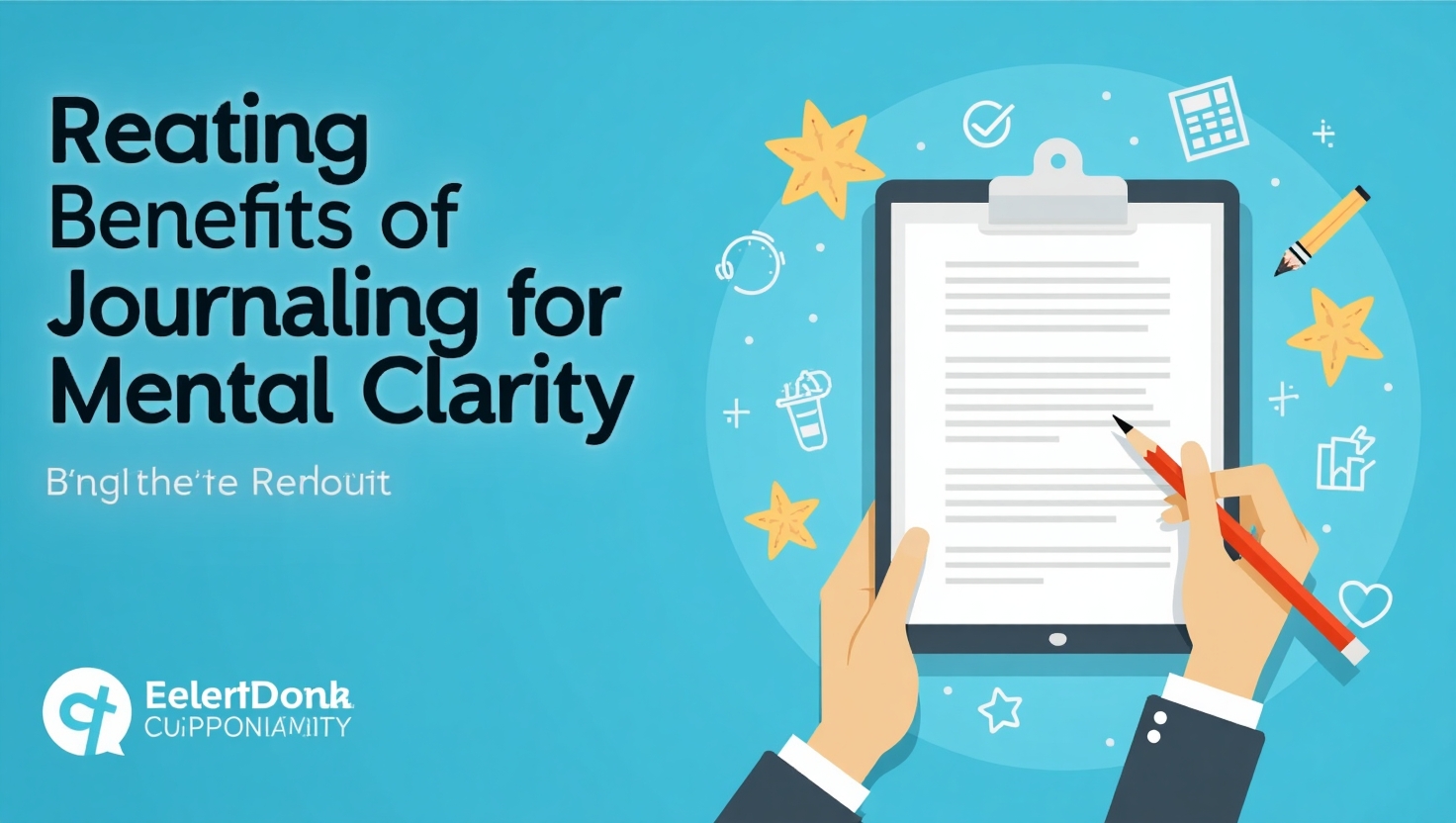Benefits of Journaling for Mental Clarity

In today’s fast-paced world, many people find themselves struggling with mental clutter, stress, and anxiety. One effective way to clear the mind and enhance mental clarity is through journaling. This simple, yet powerful practice can help organize thoughts, reduce stress, and provide valuable insights into your emotions and behavior. Whether you’re dealing with overwhelming tasks, seeking emotional release, or trying to improve your focus, benefits of journaling for mental health can transform how you approach both your personal and professional life.
Overview
Journaling is more than just a hobby—it’s a therapeutic tool that has been used for centuries to help individuals achieve mental clarity, reduce stress, and boost emotional health. Scientific benefits of journaling show that writing down thoughts can improve self-awareness, enhance problem-solving skills, and even promote personal growth. But journaling goes beyond just writing; it serves as a way to process feelings, set goals, and track progress.
In this article, we will dive into the health benefits of journaling and explore how this practice can improve mental clarity, offering a deeper understanding of its positive impact on your overall well-being. We’ll also provide some actionable tips on how to incorporate journaling into your daily routine for lasting mental clarity.
Benefits of Journaling for Mental Clarity
Journaling may seem like a simple act, but its benefits can have a profound effect on your mental clarity. Below, we explore some of the key advantages of journaling that can help declutter your mind and provide peace of mind.
Emotional Release and Stress Relief
Writing down your thoughts and emotions is an excellent way to release pent-up feelings that may be contributing to mental clutter. Health benefits of journaling include reducing stress by allowing you to express and process negative emotions. Studies have shown that writing can help reduce levels of cortisol, the stress hormone, which can improve your mood and overall well-being. By reflecting on your day or writing about challenging situations, you create an outlet for emotional expression, ultimately reducing emotional tension.
Enhanced Self-Awareness
Regular journaling encourages introspection, which can lead to greater self-awareness. As you write about your thoughts, behaviors, and feelings, you begin to identify patterns in your reactions, decision-making, and overall mental state. This benefit of journaling allows you to recognize areas of improvement and provides clarity on your personal goals, desires, and fears. It acts as a mirror, reflecting aspects of yourself that may otherwise go unnoticed.
Improved Focus and Concentration
One of the lesser-known benefits of journaling is its ability to enhance focus and concentration. Journaling helps organize your thoughts and allows you to mentally “declutter.” By putting your ideas on paper, you can clear out the distractions that occupy your mind, making room for clearer thinking and more focused attention. This is especially beneficial for individuals who struggle with staying on task or experience anxiety due to racing thoughts.
Increased Problem-Solving Ability
Journaling encourages critical thinking and self-reflection, which can lead to better problem-solving skills. As you document challenges or dilemmas you face, writing helps you break down complex issues into smaller, more manageable pieces. By outlining possible solutions, weighing pros and cons, and reflecting on past experiences, you develop a clearer approach to decision-making. This practice helps improve your ability to navigate life’s challenges with greater confidence and clarity.
Better Memory and Cognitive Function
Regular journaling can improve your cognitive function by helping you retain information and organize your thoughts more effectively. The process of writing has been linked to enhanced memory retention and comprehension, as it forces your brain to process and store information in a meaningful way. Journaling also helps reduce mental fatigue, allowing you to recall details and make decisions with a sharper mind. This is especially useful for individuals who struggle with focus or memory.
Creating a Record of Growth and Reflection
Journaling provides a tangible record of your personal growth. Over time, you can look back at your past entries and see how far you’ve come. This reflection helps to foster gratitude, boosts motivation, and reinforces positive habits. The ability to track your progress and reflect on past challenges can increase feelings of accomplishment and empower you to move forward with confidence.
Benefits of Journaling for Mental Health
When we talk about benefits of journaling for mental health, it’s clear that this practice does more than just clear mental clutter. Below are some ways journaling can support your mental health.
Reducing Anxiety and Depression
Writing about your thoughts and emotions has been shown to lower symptoms of anxiety and depression. By expressing your fears, worries, and frustrations on paper, you create an emotional release, which can reduce the intensity of these negative emotions. Additionally, journaling allows you to reframe your thoughts and look at situations from different perspectives, ultimately improving your emotional regulation.
Enhancing Emotional Intelligence
Journaling is an excellent tool for developing emotional intelligence. It helps you better understand your emotions, identify triggers, and recognize the underlying causes of your feelings. This level of self-awareness can lead to improved emotional regulation, better decision-making, and healthier relationships. Over time, this emotional intelligence can help you manage stress and maintain a positive outlook, even in challenging situations.
Promoting a Sense of Purpose and Clarity
When you write about your goals, aspirations, and values, journaling can help you achieve a deeper sense of purpose and direction. This clarity allows you to prioritize your actions, make better decisions, and stay aligned with your core values. The sense of purpose that journaling fosters can provide a strong foundation for mental well-being, reducing feelings of confusion or uncertainty.
Facilitating Mindfulness and Meditation
Journaling can be a powerful companion to mindfulness and meditation practices. Writing down your thoughts and reflections encourages mindfulness by helping you stay present and aware of your feelings in the moment. By focusing on the act of writing, you shift your attention away from external distractions and engage in self-reflection. This process can help you achieve a calmer, more focused mental state, which is essential for mental clarity.
FAQ Section
How does journaling help with mental clarity?
Journaling helps with mental clarity by organizing your thoughts, releasing pent-up emotions, and providing an outlet for self-reflection. It allows you to process information, clear mental clutter, and increase focus.
What are the scientific benefits of journaling?
Scientific benefits of journaling include reducing stress and anxiety, improving memory retention, enhancing cognitive function, and promoting emotional regulation. Research shows that journaling can improve mental health by lowering cortisol levels and fostering positive emotions.
Can journaling reduce anxiety?
Yes, journaling can reduce anxiety by providing an emotional outlet for worries and fears. Writing about your anxieties allows you to confront them and reduce their impact on your mental state.
How does journaling affect mental health?
Journaling benefits mental health by promoting emotional release, improving self-awareness, reducing stress, and enhancing overall emotional well-being. It can also help alleviate symptoms of anxiety, depression, and mental fatigue.
Is journaling effective for personal growth?
Absolutely! Journaling is an excellent tool for personal growth, as it helps track progress, reflect on experiences, and identify areas for improvement. It also promotes a sense of purpose and clarity, which can empower you to achieve your goals.
Final Thoughts
Journaling is a simple, yet powerful tool that offers numerous benefits of journaling for mental health and mental clarity. From reducing stress and anxiety to improving focus and problem-solving, journaling can significantly improve your emotional and cognitive well-being. Whether you’re looking to track your personal growth or clear your mind after a stressful day, incorporating journaling into your daily routine can be a transformative practice. So grab a notebook, start writing, and experience the many positive effects this practice has to offer.



